Answered step by step
Verified Expert Solution
Question
1 Approved Answer
A. FAIRNESS Fairness refers to equal treatment, for example, all shareholders should receive equal consideration for whatever shareholdings they hold. In addition to shareholders,
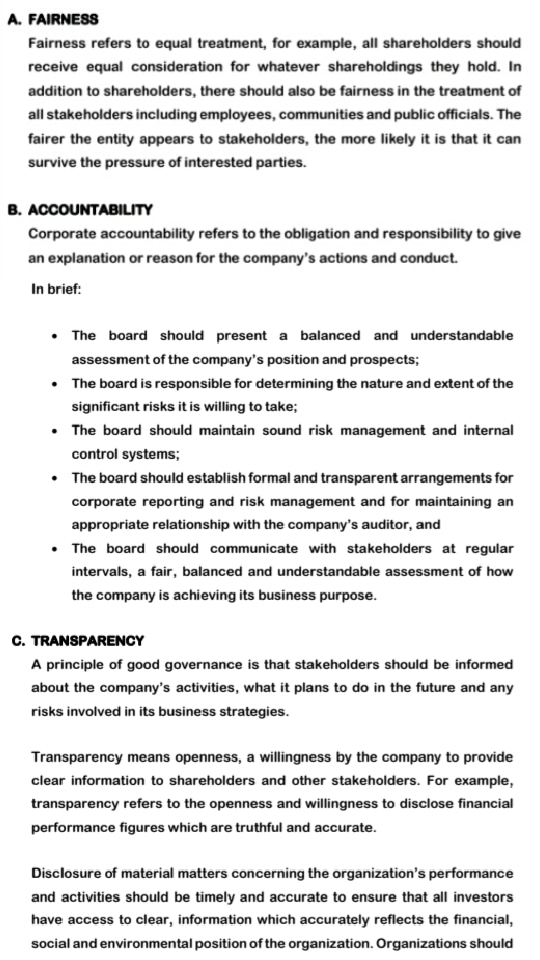
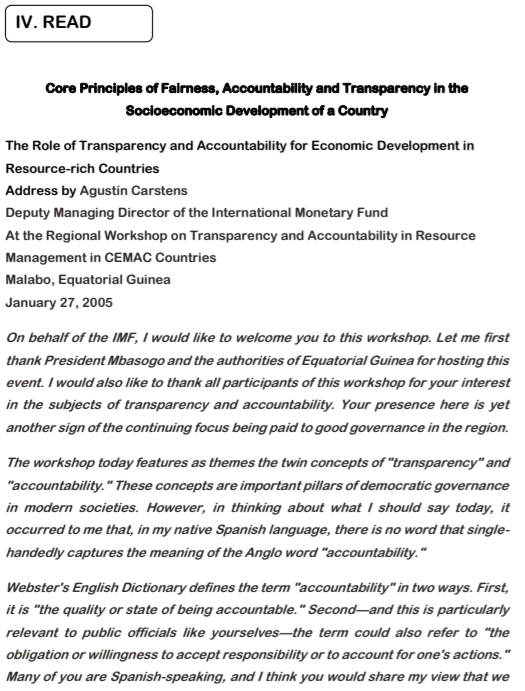
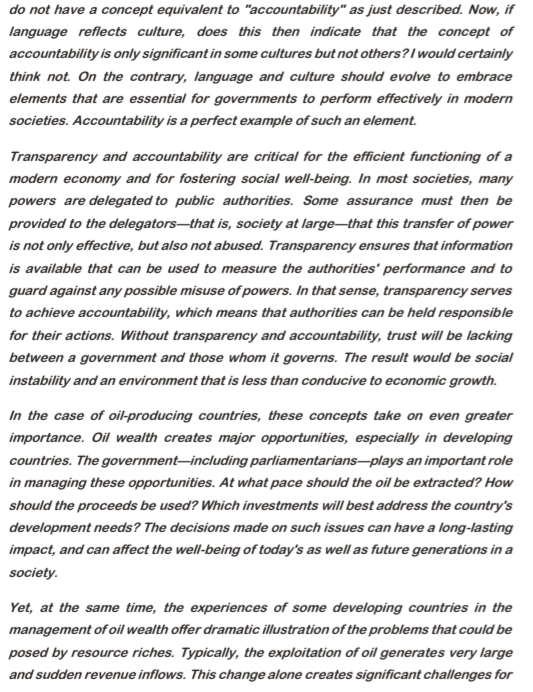
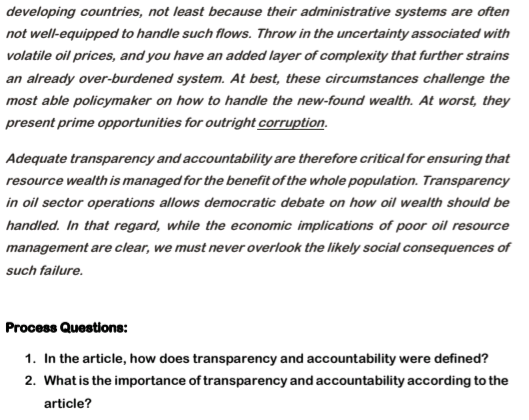
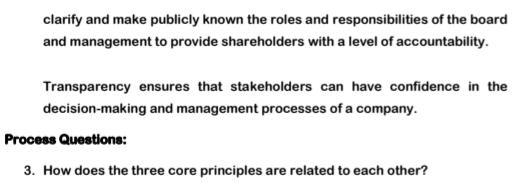
A. FAIRNESS Fairness refers to equal treatment, for example, all shareholders should receive equal consideration for whatever shareholdings they hold. In addition to shareholders, there should also be fairness in the treatment of all stakeholders including employees, communities and public officials. The fairer the entity appears to stakeholders, the more likely it is that it can survive the pressure of interested parties. B. ACCOUNTABILITY Corporate accountability refers to the obligation and responsibility to give an explanation or reason for the company's actions and conduct. In brief: The board should present a balanced and understandable assessment of the company's position and prospects; The board is responsible for determining the nature and extent of the significant risks it is willing to take; The board should maintain sound risk management and internal control systems; The board should establish formal and transparent arrangements for corporate reporting and risk management and for maintaining an appropriate relationship with the company's auditor, and The board should communicate with stakeholders at regular intervalls, a fair, balanced and understandable assessment of how the company is achieving its business purpose. C. TRANSPARENCY A principle of good governance is that stakeholders should be informed about the company's activities, what it plans to do in the future and any risks involved in its business strategies. Transparency means openness, a willingness by the company to provide clear information to shareholders and other stakeholders. For example, transparency refers to the openness and willingness to disclose financial performance figures which are truthful and accurate. Disclosure of material matters concerning the organization's performance and activities should be timely and accurate to ensure that all investors have access to clear, information which accurately reflects the financial, social and environmental position of the organization. Organizations should IV. READ Core Principles of Fairness, Accountability and Transparency in the Socioeconomic Development of a Country The Role of Transparency and Accountability for Economic Development in Resource-rich Countries Address by Agustn Carstens Deputy Managing Director of the International Monetary Fund At the Regional Workshop on Transparency and Accountability in Resource Management in CEMAC Countries Malabo, Equatorial Guinea January 27, 2005 On behalf of the IMF, I would like to welcome you to this workshop. Let me first thank President Mbasogo and the authorities of Equatorial Guinea for hosting this event. I would also like to thank all participants of this workshop for your interest in the subjects of transparency and accountability. Your presence here is yet another sign of the continuing focus being paid to good governance in the region. The workshop today features as themes the twin concepts of "transparency" and "accountability." These concepts are important pillars of democratic governance in modern societies. However, in thinking about what I should say today, it occurred to me that, in my native Spanish language, there is no word that single- handedly captures the meaning of the Anglo word "accountability." Webster's English Dictionary defines the term "accountability" in two ways. First, it is "the quality or state of being accountable." Second-and this is particularly relevant to public officials like yourselves-the term could also refer to "the obligation or willingness to accept responsibility or to account for one's actions." Many of you are Spanish-speaking, and I think you would share my view that we do not have a concept equivalent to "accountability" as just described. Now, if language reflects culture, does this then indicate that the concept of accountability is only significant in some cultures but not others? I would certainly think not. On the contrary, language and culture should evolve to embrace elements that are essential for governments to perform effectively in modern societies. Accountability is a perfect example of such an element. Transparency and accountability are critical for the efficient functioning of a modern economy and for fostering social well-being. In most societies, many powers are delegated to public authorities. Some assurance must then be provided to the delegatorsthat is, society at large-that this transfer of power is not only effective, but also not abused. Transparency ensures that information is available that can be used to measure the authorities' performance and to guard against any possible misuse of powers. In that sense, transparency serves to achieve accountability, which means that authorities can be held responsible for their actions. Without transparency and accountability, trust will be lacking between a government and those whom it governs. The result would be social instability and an environment that is less than conducive to economic growth. In the case of oil-producing countries, these concepts take on even greater importance. Oil wealth creates major opportunities, especially in developing countries. The government-including parliamentarians-plays an important role in managing these opportunities. At what pace should the oil be extracted? How should the proceeds be used? Which investments will best address the country's development needs? The decisions made on such issues can have a long-lasting impact, and can affect the well-being of today's as well as future generations in a society. Yet, at the same time, the experiences of some developing countries in the management of oil wealth offer dramatic illustration of the problems that could be posed by resource riches. Typically, the exploitation of oil generates very large and sudden revenue inflows. This change alone creates significant challenges for developing countries, not least because their administrative systems are often not well-equipped to handle such flows. Throw in the uncertainty associated with volatile oil prices, and you have an added layer of complexity that further strains an already over-burdened system. At best, these circumstances challenge the most able policymaker on how to handle the new-found wealth. At worst, they present prime opportunities for outright corruption. Adequate transparency and accountability are therefore critical for ensuring that resource wealth is managed for the benefit of the whole population. Transparency in oil sector operations allows democratic debate on how oil wealth should be handled. In that regard, while the economic implications of poor oil resource management are clear, we must never overlook the likely social consequences of such failure. Process Questions: 1. In the article, how does transparency and accountability were defined? 2. What is the importance of transparency and accountability according to the article? clarify and make publicly known the roles and responsibilities of the board and management to provide shareholders with a level of accountability. Transparency ensures that stakeholders can have confidence in the decision-making and management processes of a company. Process Questions: 3. How does the three core principles are related to each other?
Step by Step Solution
There are 3 Steps involved in it
Step: 1

Get Instant Access to Expert-Tailored Solutions
See step-by-step solutions with expert insights and AI powered tools for academic success
Step: 2

Step: 3

Ace Your Homework with AI
Get the answers you need in no time with our AI-driven, step-by-step assistance
Get Started


